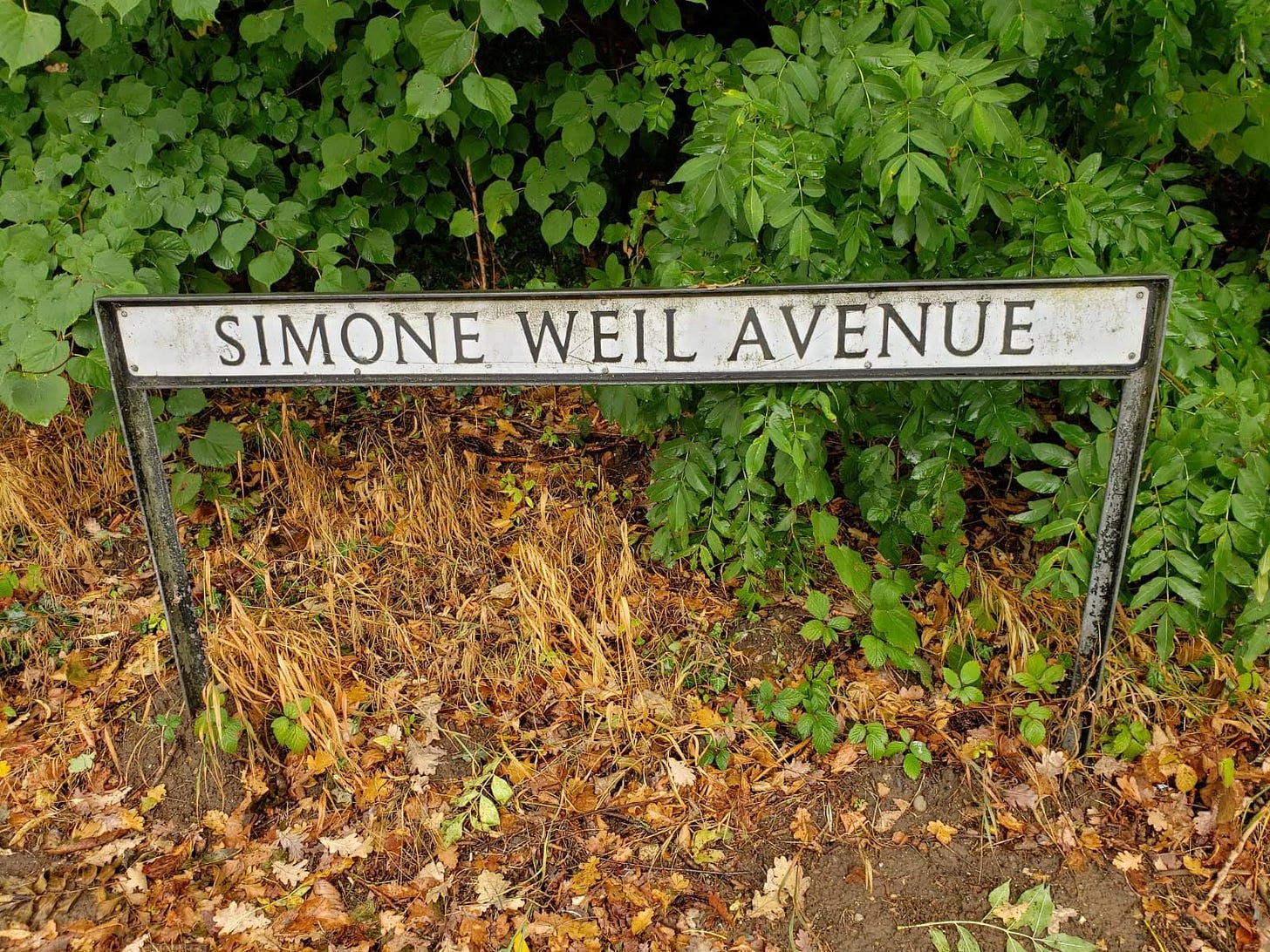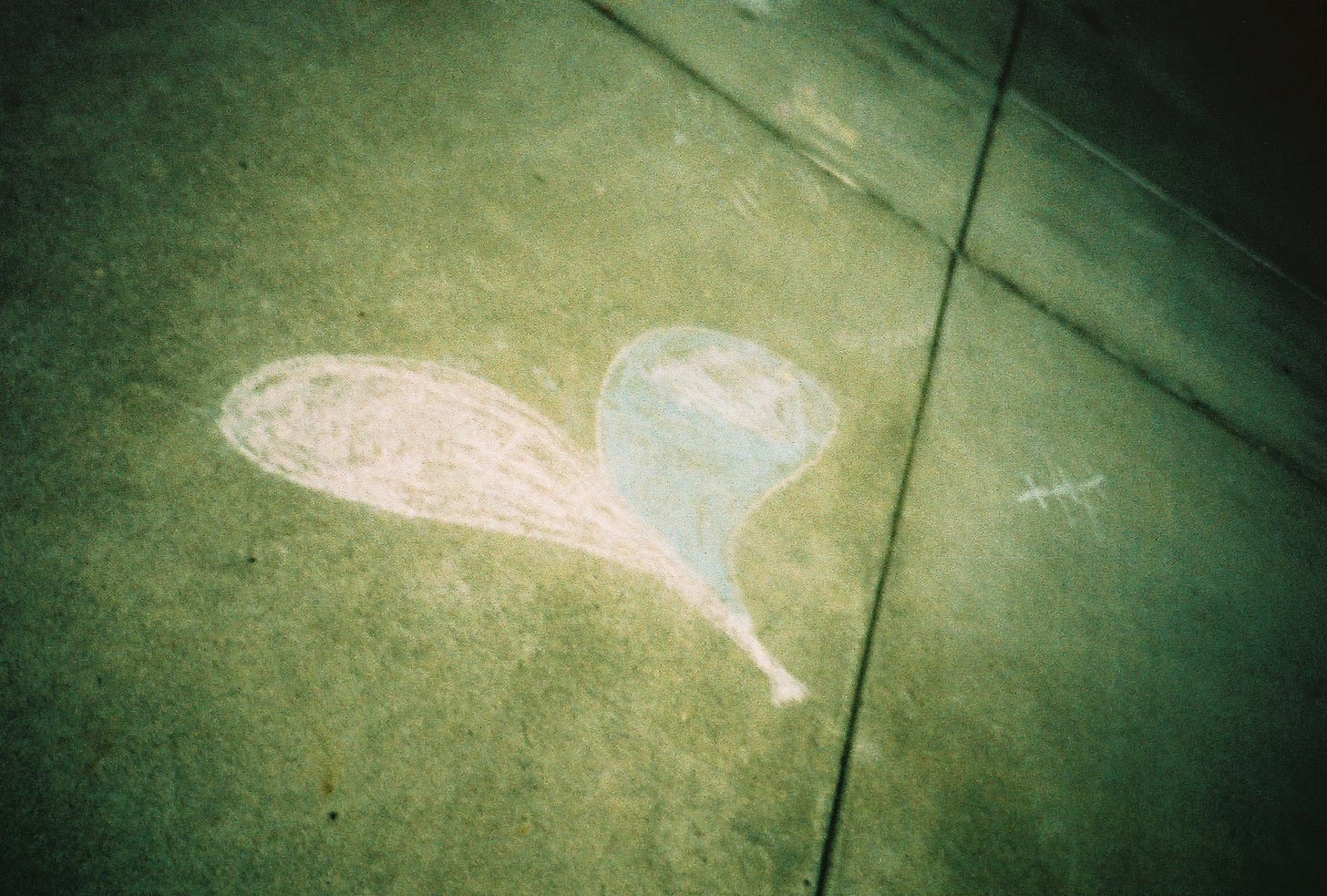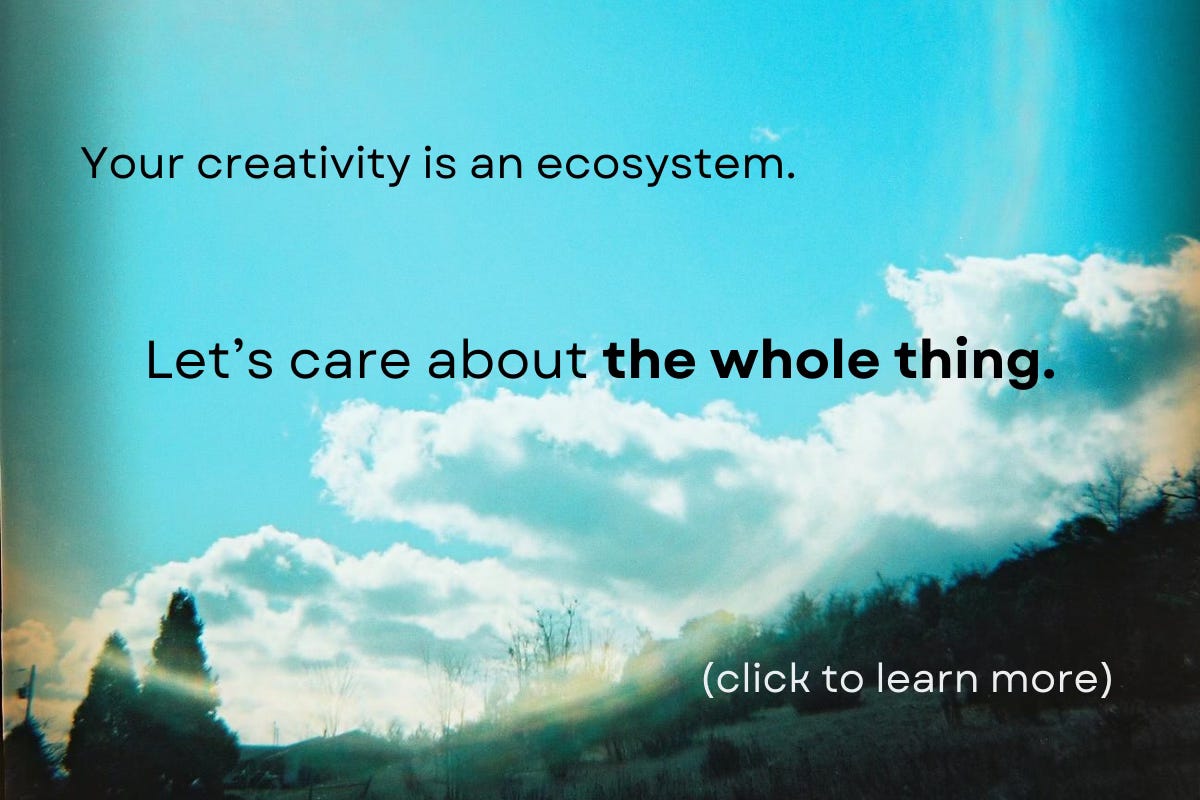For the Birds: "And suppose I should remain always what I am at this moment?"
On Simone Weil, knuckle tattoos, and my all-time favorite list
Thanks for being here! Is 2025 the year you *dive deep* in your creative work and living?
If so, I’d love to be your ally & guide.
Your creativity is an ecosystem. Let’s care about the whole thing—through tenderness, ferocious clarity, and a strengths-based lens.
During grad school, I began to have a recurring existential dilemma.
I was supplementing my English Lit degree with a minor in Women’s, Gender, & Sexuality Studies—the only thing that kept my head above water during those turbulent years—and I was coming into a fuller understanding of the way my personal traumas intersected with larger cultural oppressions.
I was also learning to recognize the gender troubles that belonged both to me and to the society I was, by happenstance, born into. To this day, it’s some of the most important learning I’ve ever experienced.1
And I felt, among other things, a growing protectiveness over the aspects of my life that had not been given enough credence, whether from peers or authority figures or, because internalized misogyny is a real thing, from myself.2
Notably, I was becoming more protective of my emotional reality—
my sensitivities, my moods and, oh my good fucking gawd: my feelings.
That they were, are, not too much. And that they did, do, matter.3
But,
as I continued down my then-failed attempts at making real progress in therapy, there was something else I was persistently aware of, too:
The way my feelings—especially the more insecure or paranoid ones, feelings I could sometimes trace back to intrusive thinking—didn’t always reflect reality, and therefore weren’t always to be fully trusted or acted upon.
And the way my feelings, at least a few of them, could tie me up in ruminating knots if I wasn’t careful or discerning enough.
And the way my feelings, some of the most common ones, fueled much of my self-doubt and self-loathing.
I did not know how to square these two realities:
How to protect and defend the existence of my feelings in the first place—this blossoming, fervent recognition that emotion and sensitivity are themselves valid forms of knowledge…
and yet…
How to be more goddamn careful around their gravitational pull.4
Then, I discovered Simone Weil.
Born on February 3, 1909, Weil was a philosopher, political activist, and mystical writer. She studied at the Lycée Henri IV and the École normale supérieure; at the latter, she finished first—just above Simone de Beauvoir—on the “General Philosophy and Logic” certificate exam. She became for a while deeply interested in Marxism, then criticized it passionately for its shortcomings, a result of the further political awakening she experienced after working for a couple of years as a factory laborer.
Weil was, by all accounts, a living saint and brilliant intellectual, driven at once by mysticism and her radical ideas about labor, work, and human suffering, ideas she worked hard not merely to understand and write about but to embody; some scholars believe that her death, at the tender age of 34, was partly a result of such.
Biographer Richard Rees put it this way:
“As for her death, whatever explanation one may give of it will amount in the end to saying that she died of love.”
Though I regularly consult my large purple Simone Weil reader, it’s a single entry from one of her personal notebooks that’s had the greatest impact on my daily living.
The entry begins:
List of temptations (to be read every morning)
Temptation of idleness (by far the strongest)
Never surrender to the flow of time. Never put off what you have decided to do.
Temptation of the inner life
Deal only with those difficulties which actually confront you. Allow yourself only those feelings which are actually called upon for effective use or else are required by thought for the sake of inspiration. Cut away ruthlessly everything that is imaginary in your feelings.
There it is: the inner life, and its occasional imaginary feelings. That internal part of us that must greet the external world daily.
Discovering these words, and Weil’s unique framing, softened something in my chest, pointing me in the direction of much-needed discernment.
Suddenly, I saw the possibility of distinguishing between the feelings that feed my intellect and creativity, versus those with no roots in anything actually confronting me; that I can look toward critical thinking and inspiration as ballasts, so to say, in order to gauge which feelings to put in the driver’s seat, and which to escort safely but assertively to the back.
I read, in that injunction to “cut away ruthlessly everything that is imaginary in your feelings,” not the perpetuation of self-doubt, but a true recognition of the place where authentic feeling stops and becomes something else, something less reliable. That there can exist inside me strong feelings that nevertheless don’t reflect the most genuine, primal parts of me.
And I realized that to be ruthless with oneself can mean invoking a sense of internal fortitude that’s as compassionate as it is protective.
From Weil’s notebook:
“Two internal obstacles to be overcome
-Cowardice before the flight of time (mania for putting things off—idleness…)
-Illusion that time, of itself, will bring me courage and energy…In fact, it is usually the contrary (sleepiness). Say to yourself: And suppose I should remain always what I am at this moment?…Never put something off indefinitely, but only to a definitely fixed time…
You live in a dream. You are waiting to begin to live…”
The creative process of orienting back to oneself
Last week, I announced that November’s Resiliency Circle will be a “list-making party,” hosted in honor of the role that a good list can play in self-regulation, getting one’s bearings, and coping with information overload—especially for a neurodivergent brain like mine. And I promised, between now and then, to share some good examples.
I think I’m so energized by this topic because when I’m losing the edges of myself, a good list—if I notice soon enough what’s happening in real time—can help bring me back.
Ruthlessness has, in many ways, saved my life, and I mostly know better than to feel embarrassed or apologetic for such a dramatic feeling.
Let me set the bar incredibly high, then, by entering Weil’s profound notebook entry as Exhibit A in the case for the orienting power of a really good list. It’s not only a testament to concision—her five short entries total a mere 138 words—but a reminder that we reach the universal through the specific and the personal. Weil’s list feels completely idiosyncratic to me, yet I could not relate to it more.
Dear readers:
1. What orients you back to yourself? And to each new day?
2. Do you have a favorite list?
3. What 8-letter word, if you had to choose one, would you put in ink on your body?
I’d love to hear yr answers <3
That being said, I frequently lament the injustice of needing to learn such fundamental stuff in a higher education classroom—an exclusive space, where privilege and financial means (or, in my case, access to crushing debt) are the price of admission.
From the linked article: “According to Forbes, technology company Hewlett-Packard discovered that when applying for a promotion, women felt like they had to meet 100% of the requirements, while men only felt they had to meet 60%.”
That’s just one horrifying snippet from a long article well worth reading, especially if you’re under the illusion that we’ve progressed past this shit. We have not.
To be clear: This has been a long, hard-won realization, one that does not stay realized; one that I must summit, fall, and re-summit repeatedly. When you’ve spent decades believing in your own emotional oppression, you can’t just turn the boat around 180°—at best, we’re talking about patient, single degree shifts, slowly and over time.
Add this to the list of reasons why, over the years, I’ve occasionally misdiagnosed myself as bi-polar or BPD, long before I would come to learn about my Autism.
To be honest, I’m still not sure that mental illness isn’t playing a role in the tremendous emotional turbulence I’ve experienced—and continue to experience—throughout most of my life. What I do know is that my Autism explains something fundamental about me, and that identifying it is helping me get closer to seeing where neurodivergence ends and something else (something weedier, with roots in trauma) begins.











I was not familiar with Simone Weil and appreciate your post telling some of her story.
Q1. What orients you back to yourself? And to each new day?
A1. For me, it's a simple 15-20 minute earlymorning meditation with a coffee. No lights or music or anything besides me, coffee, darkness, quiet.
Q2. Do you have a favorite list?
A2. My favourite list would be 2 books I read again and again: "The Zen Teaching of Bodhidhama" as translated by Red Pine and "Jonathan Livingston Seagull" by Richard Bach. My absolute top-tier favourites.
Q3. What 8-letter word, if you had to choose one, would you put in ink on your body?
A3. I thought about this one for awhile and would get "ONLY THIS" as a finger tattoo. This phrase is shortened from one of my favourite Zen/Chan stories in "The Blue Cliff Record Record" as translated by Thomas and J.C. Cleary. The scene is an elder monk shouting to a younger monk: "From birth to death, it's only this..." p,132. Sort of a Zen koan/awareness thing that has always stuck with me and is now mentally tattooed in my brain. ;)
Journaling, in some capacity, always seems to lull my senses back into their places. It’s like bringing myself home to myself. My fiancée and I spent last week in Canada, hoping for a much needed vacation away from the election stress (we voted by mail weeks prior). While we couldn’t avoid the election news (or keep it out of our heads), we journaled. We came home to ourselves, and to each other. Although list-making didn’t cross our pages while abroad, we got set on our lists when we returned to our actual home. Lists for the wedding, lists for chores to finish before going back to work, and my personal favorite: a list of anything that could help me emotionally regulate. I listed 10+ items - and promptly endeavored to initiate at least two on the list that day (journaling and sipping my favorite loose-leaf tea). Also, I think I’d get “gorgeous” tattooed on my knuckles - it is a frequent scripted response of mine, and I really just love that word.